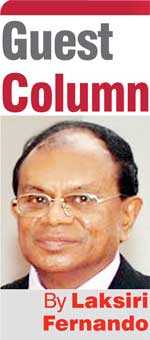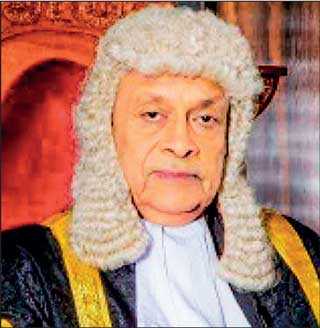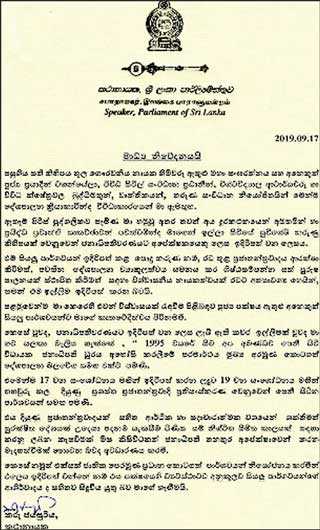Wednesday Feb 25, 2026
Wednesday Feb 25, 2026
Friday, 20 September 2019 00:00 - - {{hitsCtrl.values.hits}}
It is rather unfortunate that Mr. Karu Jayasuriya has issued a statement (17 September), as the Speaker, ‘that he is willing and ready to contest the Presidential Election, on the request of some  organisations and individuals, including Maha Sangha, however on certain conditions and objectives.’ The conditions and objectives are obviously political.
organisations and individuals, including Maha Sangha, however on certain conditions and objectives.’ The conditions and objectives are obviously political.
The statement is on the Speaker’s parliamentary letterhead and he has signed as the Speaker!
Misuse of power and position?
It is not that he cannot legally contest the Presidential Election as a party nominee or a MP, but he cannot do so as the Speaker. Use of the official letterhead and signing as the Speaker can be construed as misuse of power and his official position to unduly influence the voters. He should have done so on his personal letterhead as a MP.
He has rather started his political campaign misusing his present official position which is supposed to be independent and impartial, along with some other organisations.
It is further unfortunate that some of the so far reputed civil society organisations and personalities have dragged him into this state of affairs for obvious political and partisan reasons.
In a parliamentary democracy, the position of the speaker is rather ‘sacred,’ to mean it should be impartial, neutral and above party politics, at least during the period that the person holds the office. Even after Sri Lanka opted for a presidential system, every effort was made to preserve the parliamentary traditions at least in the affairs of the Parliament. That is why my guru, Prof. A. J. Wilson, called it a mixed system or a Gaullist system.
Traditions of neutrality and impartiality
On the question of ‘impartiality’ of the speaker and its importance, the following is what the reputed authority and scholar, Erskine May had stated:
 |
Speaker Karu Jayasuriya |
 |
Speaker Karu Jayasuriya’s use of the official letterhead and signing as the Speaker can be construed as misuse of power and his official position to unduly influence the voters. He should have done so on his personal letterhead as a MP
|
“Confidence in the impartiality of the speaker is an indispensable condition for the successful working of the procedure, and many conventions exist which have their objective not only to ensure the impartiality of the speaker but also to ensure that his impartiality is generally recognised.” (‘Erskine May: Parliamentary Practice’).
In the Speaker’s statement, he has stated: “Whatever the requests that have been made for me to contest for the presidency, I can consider them only on the basis of our consistent aim and working with the forces (Balavega) that were striving for the abolition of the executive presidential system since 1995.”
This is what has been construed as fighting for ‘the single issue of Abolition’. The Speaker has become quite militant in that sense. Be as it may, the following is most controversial for a speaker to articulate in his letterhead and in an official media statement.
“However, it is my feeling that if I contest representing the main constituent parties of the United National Front, it should be done according to the Party Constitution and with the blessings of all sections of the [party].”
The above two paragraphs are most controversial in his statement, issued using his official capacity as the Speaker, not only to articulate but also to propagate political positions for partisan purposes. If he is not the Speaker, and if he has not issued such a statement, no one can object for him contesting for the presidency. He should have resigned first.
Different international traditions
However, this is apparently not the first time that a speaker of a house is contesting for the presidency, although it is rare. Nevertheless, the traditions differ from presidential system to parliamentary system. In the US, the vice-president after election becomes the president of the Senate, similar to the speaker of the Lower House. However it is the tradition for him not to attend the debates, and the Senate elects a president pro tempore. It works fairly well.
However, the speaker of the Lower House in the US is not that. That speaker is a political leader of the House of Representatives, and is simultaneously the House’s presiding officer, and also the de facto leader of the house’s majority party. The role is partial. Although talking about the abolition of the presidential system, our present Speaker, Karu Jayasuriya, apparently is following this American tradition it seems. That can be the reason why he had issued such a statement officially.
I am aware of at least one instance where the then Speaker in 1912 in the US, James Camp Clark, entered the presidential race allegedly misusing the official position, but failed even to obtain the party candidacy. He remained the Speaker between 1911 and 1919.
Parliamentary or Westminster traditions and principles however are different and absolutely better for democracy. Although India is not a presidential system, there is a prestigious and influential position of a President elected by an electoral college. There are views expressed in Sri Lanka that it could be a suitable model for our country. Then there is a Speaker of the Lok Sabha following the Westminster traditions, unlike our own politicians who talk about those traditions, but don’t follow them, for ignorance or for other reasons. Then there is one instance in India out of past 16 Speakers after independence who contested for the presidency, and that was Sanjiva Reddy in 1977 during Indira Gandhi’s time.
As a reputed scholar N. S. Gehlot reports (‘Office of the Speaker in India’), however, as soon as he got the intention to run for the presidency, Reddy resigned from the Speaker position graciously. Even this contest for the Presidency by the Speaker, Gehlot considers a black mark on the Speaker’s independence and impartiality that Erskine May talked about.
Sanjiva Reddy held the Speaker position for two terms before, between 1967 and 1977. As he was elected to the Speaker position, he resigned from his party and that was the Congress Party. He kept his political neutrality throughout his career both as the Speaker and the President of India.
Outside positions?
There is one more issue or matter that I like to raise in this rather hurriedly-written article having come to know the ongoing calamity in my original country, Sri Lanka. In his statement, the Speaker has stated that in contesting for the presidency, he would be working “only with the parties who work for the optimum democratic reforms that were introduced by the 17th Amendment and reinforced by the 19th Amendment”. Here he is referring particularly to the Independent Commissions on which I don’t have any disagreement or issue.
However, it is questionable whether the present Constitutional Council is constituted independent enough (or truly independent) and whether the Speaker’s role as the Chairman is consistent with the independence and impartiality of his position as the Speaker in Parliament, if we were to be committed to parliamentary or Westminster traditions. The following is what I can quote from a comparative study and report by the Inter-Parliamentary Union on such a question.
“The Speaker is the undisputed authority within the House over which he presides and does not usually play any other role in the State, as can be seen from relatively modest rank he occupies in the hierarchy; he is not called upon to sit on bodies outside Parliament nor to appoint some of their members. His role in fact focuses essentially, if not exclusively, on guiding the House, notably chairing sittings.” (‘Presiding Officers of National Parliamentary Assemblies: A World Comparative Study,’ Georges Bergougnous, IPU, p. 104).
I am not expressing a strong opinion on this matter, but above is food for thought, considering the Speaker’s sometimes controversial role in the Constitutional Council and other matters. However, the immediate concern of the country and concerned people should be on the official statement that he has issued, indicating his willingness to contest for the position of the president.